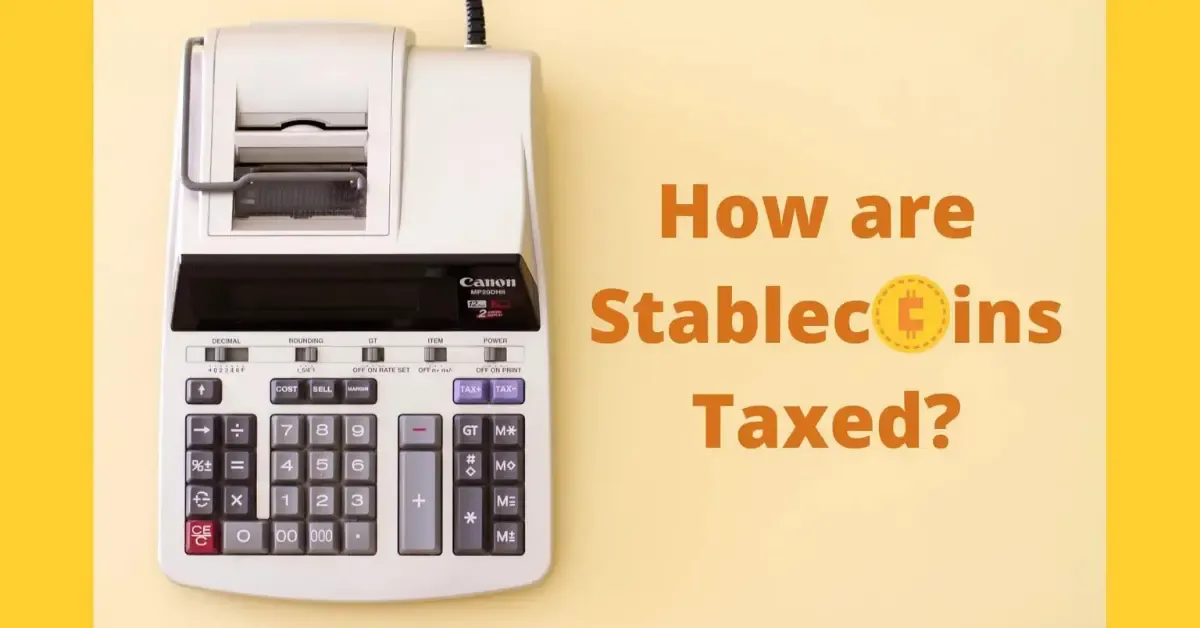How are Stablecoins Taxed?
Are stablecoins taxed? Do you need to report them? How does it all work? Let's explore below.

When we talk about stablecoins, the first thing that probably comes to mind for many of us is the fall of TerraUSD.
Since the Do Kwon project took a sharp turn and went down to a value of 0, the FUD surrounding these asset/currency-backed digital currencies overflowed.
Terra's daunting failure led to questioning pioneers in the stablecoin industry like Tether and Circle, whose investors have sounded alarms on whether their assets are sufficiently backed. We can't actually blame them; if you saw your mate's life savings go down the drain after UST's collapse, you might have probably sold every single stablecoin in your possession.
After UST's collapse, regulators, particularly in the U.S., dubbed stablecoins a risk to financial markets if not regulated. There's also the hidden factor of stablecoins posing as a very lucrative alternative to actual currencies due to their way of maintaining value.
Feds despise that stablecoins are somewhat the gray area of money, as they can't really regulate their use, and the best they could do is ban them, which sounds foul from a distance.
After all, it seems like stablecoins are here to stay. This is why financial regulators are hasty to create laws that will oversee their taxation. The confusion of taxes and stablecoins brings us to the question of the day, how do governments tax the 'unregulated' financial world of stablecoins?
Before we dive into the semantics of taxation, let us have a look at what stablecoins are;
What is a Stablecoin?
If you were to buy some cryptocurrency on any exchange, let's say Coinbase, chances are you will have to use fiat currency, at least partially. After buying the coin, the seller usually sells it to another person who uses his/her local currency (USD, EUR, etc.) to pay for the transaction. This is where things get tricky because each country has different rules regarding taxes and regulations on virtual currencies. In order to circumnavigate what seems like a financial communication barrier, the cryptoverse developed stablecoins.
Regular cryptocurrencies such as Bitcoin (BTC) and Ethereum (ETH) often endure periods of extreme volatility, which is a major drawback for people looking to use or invest in them.
For individuals wanting to utilize crypto to make purchases or save funds, extremely volatile digital assets may feel too risky for them. The development of stablecoins stems from the idea of increasing stability in the crypto space.
Unlike regular cryptocurrencies, the value of stablecoins are pegged to fiat currencies like the U.S. Dollar or Euro or backed by real estate, major virtual currencies, or commodities like gold, oil, and precious metals.
Stablecoins let people move money quickly, privately, and safely without worrying that their purchasing power will drop between the time they buy a digital asset and the time they spend it.
How Do Stablecoins Work?
Fiat-backed stablecoins usually have dollar or euro reserves maintained by licensed financial institutions. This means that each unit of a stablecoin has a real-world fiat counterpart held by a well-regulated financial institution such as a bank. These reserves are routinely checked and certified by third-party auditors. Allegedly.
Examples of fiat-collateralized stablecoins include Tether (USDT), U.S. Coin (USDC), and True USD (TUSD).
On the other hand, commodity-backed stablecoins are pegged to the market value of a commodity unit, such as an ounce of gold. Paxos Gold (PAXG) is one of the best examples of this type of stablecoin.
Some stablecoins maintain stability by over-collateralizing other cryptocurrencies such as BTC and ETH. Liquity's decentralized and resilient $LUSD is an example of a crypto-collateralized stablecoin. It is backed by ETH only.
Lastly, there are algorithmic stablecoins that use sophisticated algorithms to automatically alter the supply of a cryptocurrency to maintain its market price within a predetermined range. The most (in)famous example of an algorithmic stablecoin is Terra USD, which crashed and burned after losing its peg to the dollar back in May.
The bottom line is that stablecoins must be tied to some form of an underlying asset to maintain price stability. Typically, when a new stablecoin is issued, it is collateralized by one of these underlying assets.
After the cryptocurrency circulates, the issuer holds the same amount of the underlying asset. As long as the issuer retains the underlying asset, the stablecoin will keep its value pegged at the asset.
When Are Taxes Payable on Stablecoins?
Many jurisdictions are still formulating administrative guidelines on stablecoins, but the general view is that they are assets. Consequently, stablecoin transactions may be subject to income or capital gains tax.
If you trade with stablecoins, you may need to report them as capital gains. However, if you use them solely for personal transactions, you won't owe any taxes.
This is because the price of stablecoins is subject to slight fluctuations regardless of their much-touted stability. There are situations in which you may experience either a capital gain or loss. When trading large amounts of stablecoins, even modest price changes can result in a measurable profit or loss of wealth. These capital gains (or losses) must be reported and may be subject to taxation.
Converting Other Cryptocurrencies Into Stablecoin and Vice-Versa
The exchange of traditional cryptocurrencies such as BTC or ETH for stablecoins is a taxable event. However, whether financial authorities see it as business revenue or a capital gain depends on the specifics of each situation.
However, because the value of stablecoins is somewhat fixed, there shouldn't be a gain or loss from the conversion, so there shouldn't be any tax to pay.
But even if the capital gain is $0, most jurisdictions still require you to report the sale of a stablecoin as income.
Receiving Stablecoins in Exchange for Goods and Services
Getting paid in stablecoins is not too dissimilar from getting paid in fiat, which is considered taxable income. For tax purposes, the crypto asset's value lies on its fair market value on the date it was received.
Stablecoins are easy to figure out because their ratio is 1-to-1. This means that if you get 500 USDT, it's the same as getting $500. But spending $500 worth of USDT is not the same as spending $500 in cash. Instead, it is considered a sale of assets subject to capital gains.
If you use a stablecoin tied to a commodity like gold and the price of the commodity changes and you either make or lose money on your investment, you may have to pay capital gains tax.
Again, you won't have capital gains if the value of the stablecoin is tied to a fiat currency. But you still have to record and report the transaction.
Issuance and Redemption of Stablecoins
Generally, when you purchase stablecoins using fiat currency, it is not a taxable event, as it is essentially a transfer of fiat money into digital money. In the same way, there shouldn't be a tax on stablecoins that are backed by precious metals.
When stablecoins are redeemed, they are changed back to the physical commodities or fiat currencies used as collateral. Given that one stablecoin typically corresponds to a specific quantity of precious metals or fiat currency, due to the supposedly stable nature of stablecoins, there should be no gain or loss upon such a redemption.
Consequently, redemptions typically do not result in any tax liability. However, if there is a discrepancy between the amount of fiat obtained from the sale of stablecoins and the cost of buying them, a profit or loss will result. If there is a gain, tax authorities may classify it as either business income or capital gain, which makes the transaction taxable.
Conclusion
Despite the Terra (LUNA) debacle, stablecoins still hold much promise for use in commerce. But like the rest of the crypto space, they require more clear-cut regulations surrounding their acceptable use and taxation.
However, while these regulations are under development, make sure to report any stablecoin transaction, whether profitable or not, lest tax authorities suspect you of underreporting your taxable income.
Want to know how you can support Crypto Fireside?
Sign up below. It's free and easy 🔥.
